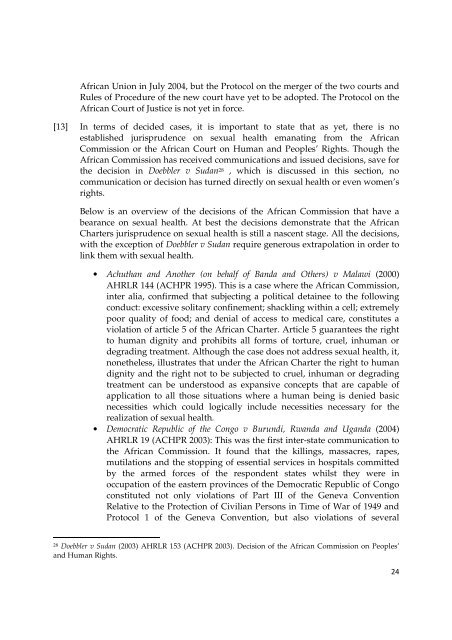sexual health and human rights in the african region - The ICHRP
sexual health and human rights in the african region - The ICHRP
sexual health and human rights in the african region - The ICHRP
Create successful ePaper yourself
Turn your PDF publications into a flip-book with our unique Google optimized e-Paper software.
African Union <strong>in</strong> July 2004, but <strong>the</strong> Protocol on <strong>the</strong> merger of <strong>the</strong> two courts <strong>and</strong><br />
Rules of Procedure of <strong>the</strong> new court have yet to be adopted. <strong>The</strong> Protocol on <strong>the</strong><br />
African Court of Justice is not yet <strong>in</strong> force.<br />
[13] In terms of decided cases, it is important to state that as yet, <strong>the</strong>re is no<br />
established jurisprudence on <strong>sexual</strong> <strong>health</strong> emanat<strong>in</strong>g from <strong>the</strong> African<br />
Commission or <strong>the</strong> African Court on Human <strong>and</strong> Peoples’ Rights. Though <strong>the</strong><br />
African Commission has received communications <strong>and</strong> issued decisions, save for<br />
<strong>the</strong> decision <strong>in</strong> Doebbler v Sudan 28 , which is discussed <strong>in</strong> this section, no<br />
communication or decision has turned directly on <strong>sexual</strong> <strong>health</strong> or even women’s<br />
<strong>rights</strong>.<br />
Below is an overview of <strong>the</strong> decisions of <strong>the</strong> African Commission that have a<br />
bearance on <strong>sexual</strong> <strong>health</strong>. At best <strong>the</strong> decisions demonstrate that <strong>the</strong> African<br />
Charters jurisprudence on <strong>sexual</strong> <strong>health</strong> is still a nascent stage. All <strong>the</strong> decisions,<br />
with <strong>the</strong> exception of Doebbler v Sudan require generous extrapolation <strong>in</strong> order to<br />
l<strong>in</strong>k <strong>the</strong>m with <strong>sexual</strong> <strong>health</strong>.<br />
• Achuthan <strong>and</strong> Ano<strong>the</strong>r (on behalf of B<strong>and</strong>a <strong>and</strong> O<strong>the</strong>rs) v Malawi (2000)<br />
AHRLR 144 (ACHPR 1995). This is a case where <strong>the</strong> African Commission,<br />
<strong>in</strong>ter alia, confirmed that subject<strong>in</strong>g a political deta<strong>in</strong>ee to <strong>the</strong> follow<strong>in</strong>g<br />
conduct: excessive solitary conf<strong>in</strong>ement; shackl<strong>in</strong>g with<strong>in</strong> a cell; extremely<br />
poor quality of food; <strong>and</strong> denial of access to medical care, constitutes a<br />
violation of article 5 of <strong>the</strong> African Charter. Article 5 guarantees <strong>the</strong> right<br />
to <strong>human</strong> dignity <strong>and</strong> prohibits all forms of torture, cruel, <strong>in</strong><strong>human</strong> or<br />
degrad<strong>in</strong>g treatment. Although <strong>the</strong> case does not address <strong>sexual</strong> <strong>health</strong>, it,<br />
none<strong>the</strong>less, illustrates that under <strong>the</strong> African Charter <strong>the</strong> right to <strong>human</strong><br />
dignity <strong>and</strong> <strong>the</strong> right not to be subjected to cruel, <strong>in</strong><strong>human</strong> or degrad<strong>in</strong>g<br />
treatment can be understood as expansive concepts that are capable of<br />
application to all those situations where a <strong>human</strong> be<strong>in</strong>g is denied basic<br />
necessities which could logically <strong>in</strong>clude necessities necessary for <strong>the</strong><br />
realization of <strong>sexual</strong> <strong>health</strong>.<br />
• Democratic Republic of <strong>the</strong> Congo v Burundi, Rw<strong>and</strong>a <strong>and</strong> Ug<strong>and</strong>a (2004)<br />
AHRLR 19 (ACHPR 2003): This was <strong>the</strong> first <strong>in</strong>ter-state communication to<br />
<strong>the</strong> African Commission. It found that <strong>the</strong> kill<strong>in</strong>gs, massacres, rapes,<br />
mutilations <strong>and</strong> <strong>the</strong> stopp<strong>in</strong>g of essential services <strong>in</strong> hospitals committed<br />
by <strong>the</strong> armed forces of <strong>the</strong> respondent states whilst <strong>the</strong>y were <strong>in</strong><br />
occupation of <strong>the</strong> eastern prov<strong>in</strong>ces of <strong>the</strong> Democratic Republic of Congo<br />
constituted not only violations of Part III of <strong>the</strong> Geneva Convention<br />
Relative to <strong>the</strong> Protection of Civilian Persons <strong>in</strong> Time of War of 1949 <strong>and</strong><br />
Protocol 1 of <strong>the</strong> Geneva Convention, but also violations of several<br />
28 Doebbler v Sudan (2003) AHRLR 153 (ACHPR 2003). Decision of <strong>the</strong> African Commission on Peoples’<br />
<strong>and</strong> Human Rights.<br />
24
















